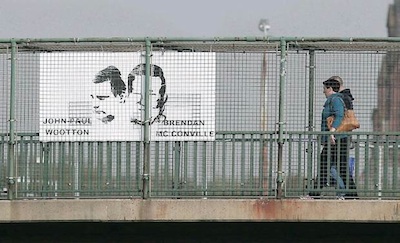
Brendan McConville and John Paul Wootton are to go before the highest court in British law in a bid to clear their names after receiving permission to do so this week.
Senior judges in Belfast have certified a legal question for lawyers representing the two men, known as the ‘Craigavon Two’, to take to the Supreme Court in London.
Both men are serving life sentences after being jointly convicted of a Continuity IRA attack in 2009 in which a member of the PSNI to be killed.
The evidence against the two men involves only conflicted eyewitness testimony and compromised forensic data. While it was never shown that either McConville or Wootton fired the fatal weapon, substantive weight was instead given to the the men’s failure to testify on their own behalf. Nevertheless, Justice Girvan declared the case to be “compelling” and declared that both were “intimately involved” in the killing.
In May this year both men failed in attempts to have their murder convictions overturned. An last week, Mr Wootton’s minimum jail term was increased from 14 to 18 years after the Court of Appeal ruled it was unduly lenient. Mr McConville is to serve at least 25 years behind bars.
But their lawyers returned to the Court of Appeal seeking permission to take their case to the Supreme Court. A panel chaired by Chief Justice Declan Morgan refused leave. However, the judges have now agreed to certify a question that Morgan said would “get them through the door into the Supreme Court”.
The defence question that the appeal court forwarded to the supreme court is: “Whether, in a case which the prosecution is insufficient to establish any specified role in a crime by the appellant and there is no direct evidence of any agreement with those involved in the murder, is it proper to permit the drawing of adverse inferences against the appellant by reason of his failure to give evidence, such an inference contributing to the conclusion on the totality of the evidence that the appellant was beyond reasonable doubt involved in the crime in some undefined way?”
Mr Wootton’s lawyer John Finucane said: “With my client maintaining his innocence he welcomes the opportunity to continue his fight to clear his name before the Supreme Court.”
Mr McConville’s lawyer Peter Corrigan said the conviction was a miscarriage of justice and described yesterday’s ruling as “a great boost to the campaign”.
PLACARD
Meanwhile, a placard in support of the campaign was erected on the Divis bridge in Belfast, prompting outrage in the unionist media over what was described as the “glorification of terror”.
The chair of the ‘Justice for the Craigavon Two’ campaign, councillor Angela Nelson, pointed out that the campaign is non-political. She said that many human rights groups and individuals support the campaign, including its late chairperson Gerry Conlon.
“As a group we welcome acts of solidarity that raise awareness of this injustice,” she said. “When main stream media turns a blind eye to injustice then people will use all means at their disposal to get the message out.”
![[Irish Republican News]](https://republican-news.org/graphics/title_gifs/rn.gif)
![[Irish Republican News]](https://republican-news.org/graphics/title_gifs/harp.gif)

